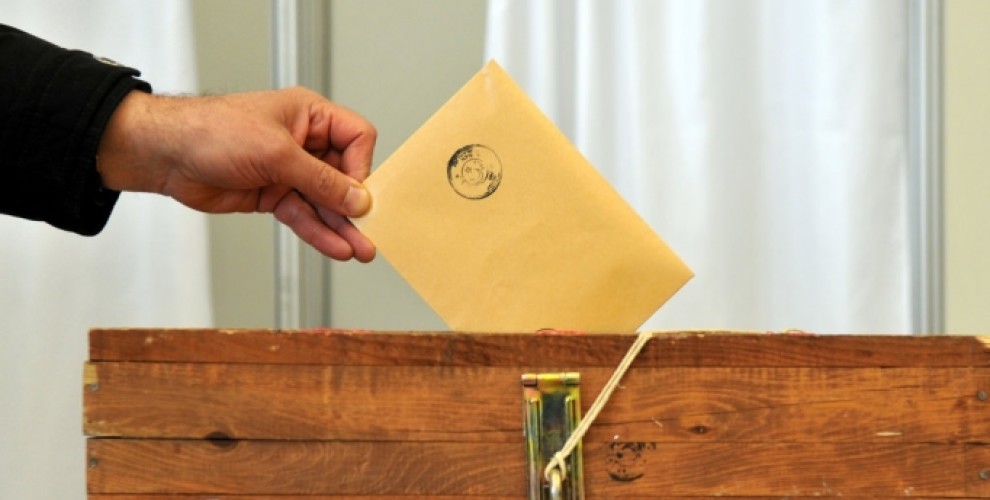56 million voters called to the polls
Station polls open in Turkey for historic elections.
Station polls open in Turkey for historic elections.

56 million voters are called to the polls in Turkey on Sunday.
The key vote against Erdoğan fascism is in the hands of Kurdish voters.
The 24 June elections are considered as elections carrying all kinds of dangers. For Turkish President Recep Tayyip Erdoğan is of vital importance maintaining the fascist regime he has established, while for his opponents is the chance to end with fascism. These elections could actually end Erdoğan’s 15 years rule.
The AKP-MHP alliance tried to catch its opponents unprepared by calling an early election at a time when social, political, and economic problems were deepening.
The elections are happening a year before their scheduled date. The new date chosen is 24 June. This time, however, the calculations did not seem to add up to what the AKP wanted. In fact a stronger opposition actually emerged.
Kurds will determine the results of the elections.
After Erdoğan lost the majority in the parliament on 7 June 2015 as a consequence of the success of the HDP, he called new elections in November, thus invalidating the previous results to achieve absolute majority.
Record participation abroad
Interest in this historic election has been first showed from voters abroad. A record participation has been achieved. Almost half of the registered voters abroad, or 48 percent, went to the polls. Participation at customs has not been disclosed yet.
1.49 million people voted in the centres opened abroad.
In November 2015 participation was of 1.3 million, while 1.4 million people voted in the constitutional referendum in April 2017.
Election count and constituencies
In the 24 June elections, 56 million 322 thousand 632 voters are called to the polls. A total of 180 thousand 65 polling stations were set up in 81 provinces.
There are 87 electoral districts throughout the country.
Istanbul, which has three electoral districts, was the region with the highest number of electors and the region with the largest number of candidates.
In these elections, as per the Constitutional referendum of April 2017, the number of seats in the Assembly will rise to 600 from 550.
According to the election law, news, predictions and commentaries on the elections results are prohibited in the media until 6 pm on Sunday. Between 6 pm and 9 pm, news and announcements will be given only by Supreme Electoral Board (YSK).
The ban on broadcast will be lifted at 9 pm.
415 observers
Elections in Turkey are closely monitored in the whole world. 415 people from eight international institutions have been accredited to observe the elections. These include 234 people from the OSCE and 35 people from the Council of Europe Parliamentary Assembly.
The European Parliament has decided not to follow the elections and not to comment.
Polls safety
One of the biggest concern in these elections is the possibility of fraud, a possibility which is increasing.
For this reason, all opposition parties took their own precautions to protect the polls.
The HDP, will deployed 80 thousand people to ensure safety at polls, 100 thousand people will work as observers and 20 thousand people have been selected to stand at schools.
The CHP formed the Provincial Elections Monitoring and Coordination Center in 81 provinces.
In addition, the CHP, Iyi (Good) Party, Saadet (Felicity) Party, HDP and voluntary civil society organizations created the "Fair Election Platform" to follow voting operations.
Within the framework of the work carried out by the “Fair Election Platform”, a total of 600 thousand polling officers have been assigned the protection of the ballot papers.
Presidential Election
Voters on Sunday will go to the polls both to elect the President and to renew the Parliament.
Six candidates are contesting the presidential election.
Against Erdoğan will run: Muharrem İnce, the candidate of the CHP, Selahattin Demirtaş, the candidate of the HDP, Meral Akşener, the candidate of the Iyi (Good) Party, Temel Karamollaoğlu, candidate of the Saadet (Felicity) Party, and Doğu Perinçek, the candidate of the Vatan (Homeland) Party.
Another feature of the 24 June elections is related to alliances.
The CHP, the Good Party and the Felicity Party have got together in the "Nation Alliance", while the two fascist parties, the AKP and the MHP, have got together in the "Popular Alliance".
The HDP will run both elections as a democracy front uniting a broader section of groups and parties under its lead.
The parties that will run the election are as follows:
Popular Alliance (Justice and Development Party, MHP), HUDA PAR, Vatan Party, HDP, Nation Alliance (CHP, Saadet Party, Iyi Party)